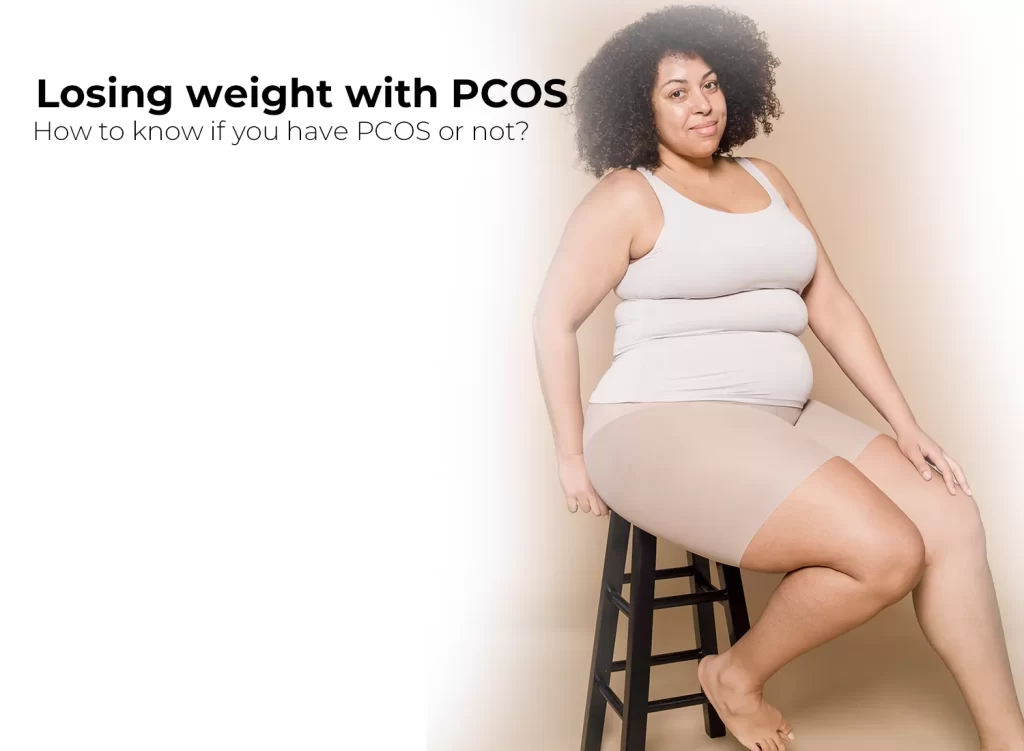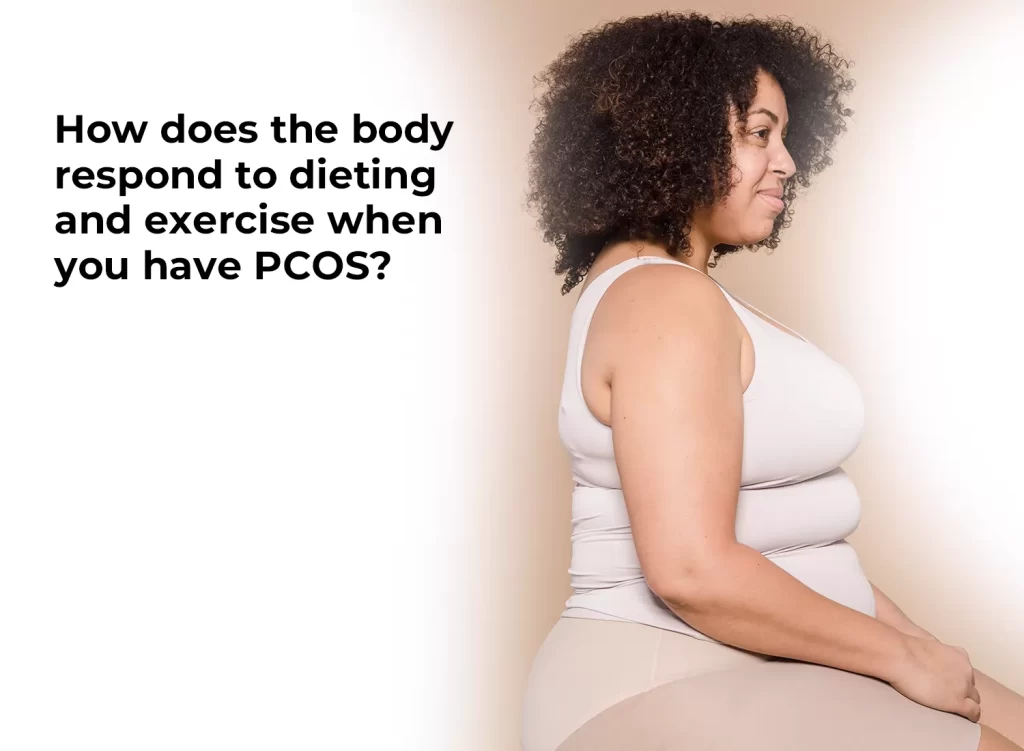Losing weight with PCOS
What is PCOS?
PCOS is one of the most common causes of female infertility, affecting 6 percent to 12 percent (as many as 5 million) of reproductive-age women in the United States. PCOS is a hormonal disorder that affects the production of eggs. However, it is much more than that. In fact, this is a lifelong health condition that lasts well past the childbearing years.
Often, women with PCOS are insulin resistant, meaning that their bodies can produce insulin but are unable to use it effectively, increasing their risk of developing type 2 diabetes. A higher concentration of androgens (male hormones that are also present in females) is found in them, which can prevent eggs from being released (ovulation) and cause irregular periods, acne, thinned scalp hair, and excessive hair growth on the face and body.
Women who have PCOS are at risk of developing serious health problems, particularly if they are obese:
- Diabetes—by the time they reach the age of 40, more than half of women with PCOS have type 2 diabetes.
- Type 2 diabetes can develop in both the mother and the child as a result of gestational diabetes (diabetes while pregnant), which puts the pregnancy and the baby at risk.
- Women with PCOS are at increased risk for heart disease, and the risk increases with age.
- High blood pressure—which can cause damage to the heart, brain, and kidneys—is a serious health problem.
- Having a high LDL (“bad”) cholesterol level and a low HDL (“good”) cholesterol level increases the risk of developing cardiovascular disease.
- Sleep apnea is a sleep disorder that causes breathing to stop during sleep, increasing the risk of heart disease and type 2 diabetes in those who suffer from it.
- Plaque associated with a stroke (cholesterol and white blood cells) A buildup of plaque in the blood vessels can result in blood clots, which can then result in a stroke.
- PCOS has also been linked to depression and anxiety, though the exact nature of this association is still unclear.
See also Starting Your Weight-Loss Journey and Get Inspired by Chrissy Metz’s Incredible Weight Loss Story
How to know if you have PCOS or not?
Because PCOS symptoms can be unspecific or mimic symptoms of other conditions, it is possible that you will go undiagnosed for a period of time. Although there is no single test for PCOS, a physical exam, ultrasound, and blood tests can all assist in the diagnosis.
To be diagnosed, you must meet at least two of the three “official” mentioned conditions below:
- Period irregularities, such as heavy bleeding or missed periods, are caused by missed ovulation, which is the release of an egg from your ovaries. This also helps to prevent you from becoming pregnant in the future.
- Signs of higher-than-normal levels of androgens, which are male hormones that are present in women as well. They can cause unwelcome hair growth, known as hirsutism, on your face—particularly on the upper lip and chin—as well as on your back, chest, and other areas where men usually grow hair. You may notice that your hair is falling out or thinning. It is possible to detect those androgens in blood tests.
- On your ovaries, you may have collections of 12 or more egg follicles, known as cysts, which may be larger than normal. Cysts will be checked for by your doctor using ultrasound technology. Females who do not have PCOS may also have cysts, but fewer than 12 of these women meet the criteria for being diagnosed with PCOS. In some cases, women with PCOS may not have cysts at all.
What is the cause of PCOS?
Is PCOS a result of something else?
However, although the exact causes are unknown at this time, it is believed that elevated androgen levels play a significant role. Additional risk factors include being overweight or having a family history of insulin resistance, both of which are linked to insulin resistance.
- Weight
Are there any links between being overweight and PCOS? What percentage of the population has PCOS and what percentage does not. The relationship is difficult to understand and is fraught with misunderstandings and difficulties. Although being overweight is connected with PCOS, many women of normal weight also have the condition, and many overweight women do not, according to research.
- Genetics
Women who have PCOS or type 2 diabetes in their mothers or sisters are more prone to develop the condition.
- Insulin Resistance
Diet and physical activity can have significant effects on insulin resistance, particularly in overweight women who have a poor diet and do not engage in regular exercise. It is also possible that insulin resistance is genetic. Regardless of the underlying reason for insulin resistance, losing weight can often alleviate symptoms.
PCOS is characterized by a number of common symptoms
Some women begin to experience symptoms around the time of their first menstrual cycle. Others learn they have PCOS only after they have gained a significant amount of weight or have experienced difficulties getting pregnant.
The following are the most prevalent PCOS symptoms:
- Periods that are not regular.
Because of a lack of ovulation, the uterine lining does not shed on a monthly basis as it should. Some women with PCOS have fewer than eight menstrual cycles per year, and some have none at all.
- There is a lot of bleeding.
In order to accommodate the accumulation of uterine mucus for a longer period of time, the periods you do get may be heavier than usual.
- Hair growth
The disorder causes more than 70% of women with it to develop hair on their faces and bodies, including their backs, bellies, and chest. Hirsutism is a medical term that refers to excessive hair growth.
- Acne.
Manly hormones can cause the skin to become greasy and prone to breakouts, especially on areas such as the face, chest, and upper back.
- Weight growth is a problem.
Women with PCOS are often overweight or obese, with up to 80 percent being overweight or obese.
Male pattern baldness is a type of hair loss that occurs in men. The hair on the scalp thins and may eventually fall off.
- Skin darkening
It is possible to develop dark patches of skin in body creases such as those on the neck, in the crotch, and under the breasts.
- Headaches.
Some women experience headaches as a result of hormonal changes.
See also How Rick Ross Lost 75lbs and How You Can Do It Yourself
How does the body respond to dieting and exercise when you have PCOS?
The body responds to dieting and exercise in a different way when you have PCOS than it does for women without PCOS. Dieting alone may not be enough when you have PCOS, so it’s important to also work out regularly as well.
In the last few years, researchers have done a number of studies on the “best” diet types for those who have PCOS to follow. The Androgen Excess and PCOS Society used the findings of this study to develop recommendations for women, which included the following:
- If you are overweight, you should limit your daily calorie consumption by 500 to 1,000 calories.
- Reduce your overall fat intake to less than 30% of your total calorie intake for the day, if possible. Saturated fats, such as those found in high-fat steak, butter, cheese, and full-fat dairy products, should account for no more than 10% of your total daily calorie consumption.
- Replace high-fat foods with fiber, whole-grain bread and cereals, fruits, and “good” sources of fat, such as nuts and avocados, as opposed to high-fat foods.
- Aim to consume no more than 200 mg of cholesterol per day.
- Trans fats should be avoided at all costs.
- Increase the amount of fiber you consume by 5 to 10 grams per day in your daily diet.
- In the event that you are unsure of where to begin with these dietary modifications, consult your doctor. Your doctor may also recommend that you consult with a dietician in order to develop an eating plan that is tailored to the needs of women with PCOS.
Diet and exercise
Exercise to improve your PCOS does not have to take up hours of your time each week to be effective. Research has revealed exercise sessions ranging from 30 minutes per day, three times a week, to three total hours per week were effective in alleviating the metabolic and reproductive symptoms associated with PCOS.
Plan your exercise schedule and activities
Androgen Excess and PCOS Society suggest that you engage in moderate to strenuous physical exercise for at least 30 minutes each day and that you increase your activity intensity when you are able. The following are some examples of how you might include fitness into your daily routine:
You can design your own interval training routine in which you set up approximately six stations and work out at each station for approximately one to two minutes at a time. Examples include the following:
- squats
- jumping jacks
- lunges
- bicep curls
- crunches
- Walking for 30 to 45 minutes a day, on a treadmill or outside, can help you lose weight.
- Take an aerobics class either online or at a local fitness center. Step, dancing, boxing, and spinning are just a few examples.
- Attend a high-intensity interval training (HIIT) class at a gym or use online tools. There are numerous workout videos available on YouTube that you may finish at your leisure. Simply make certain that the routine comes from a respected vendor.
- Yoga, Pilates, or tai chi can be practiced in a studio, gym, or online utilizing a video class. If you have never practiced previously, you may want to seek the supervision of a trainer who can assess your form and ensure your overall safety.
- Use a combination of these exercise types if boredom is a factor in your commitment to an exercise regimen. For example, complete three different exercise session types three times a week to keep your commitment fresh.
Best diet and lifestyle changes for women with PCOS
Plan for a nutritious diet
With each meal and snack, make an effort to incorporate the following healthy eating habits:
Each meal should include a serving of lean protein, such as skinless chicken breasts, fish, or tofu, as a main dish or side dish.
Healthy fats, such as olive oil, should be used in the kitchen when cooking.
Fill in the blanks with a vegetable of your choice (broccoli, kale, spinach, or peppers).
Beans, almonds, and lentils are good sources of protein.
Red grapes, blueberries, oranges, and cherries are examples of vibrantly colored fruits.
Choose whole-grain bread and spaghetti as your bread and pasta choices.
With the help of these suggestions, you may frequently keep within the daily calorie requirements for your general height, health status, and body weight.
Tips to help you stay on track
- Cut back on your carbohydrate intake.
Because carbohydrates have an impact on insulin levels, reducing your carbohydrate intake may be beneficial in managing PCOS.
Insulin resistance affects approximately 70% of women with PCOS, which occurs when your cells cease to recognize the effects of the hormone insulin.
Insulin is required for the regulation of blood sugar levels and the storage of energy in your body. beginner cycle High insulin levels have been linked to increased body fat and weight gain in the general population as well as in women with PCOS, according to the research.
The results of one study showed that obese women with PCOS and insulin resistance first followed a 3-week diet consisting of 40 percent carbohydrates and 45 percent fat, then a 3-week diet consisting of 60 percent carbohydrates and 25 percent fat. During each phase, protein consumption was 15 percent of total calories.
While blood sugar levels remained consistent throughout the two phases of the diet, insulin levels dropped by 30% during the lower-carb, higher-fat phase.
Furthermore, a low-glycemic diet may be beneficial for those who have PCOS. It is measured by the glycemic index (GI), which indicates how quickly a particular diet elevates blood sugar levels.
In one trial, women continued their usual diet for 12 weeks before switching to a low-GI diet for another 12 weeks. During the low-GI phase, their insulin sensitivity (i.e., how efficiently the body uses insulin) measurements were much better than before.
- Consume a sufficient amount of fiber
In part, because fiber helps you feel full after a meal, a high-fiber diet may help people with PCOS lose weight more effectively.
RDI for fiber in the United States is 14 grams per 1,000 calories — or approximately 25 grams per day for women — and is calculated as 14 grams per 1,000 calories. Women in the United States, on the other hand, consume only 15–16 grams of fiber per day on average.
Higher fiber intake was connected to lower insulin resistance, total body fat, and waist circumference in women with PCOS, but not in women without PCOS, according to a recent study.
In another study, which included 57 women with this condition, higher fiber consumption was found to be associated with a smaller waist size.
- Consume an appropriate amount of protein
The consumption of protein after a meal helps to maintain blood sugar levels and boost feelings of fullness.
It may also help you lose weight by reducing your cravings, increasing your calorie burn, and controlling your hunger hormones, among other benefits.
In one study, 57 women with PCOS were randomly assigned to either a high-protein diet containing more than 40% of calories from protein and 30% from fat or a conventional diet containing less than 15% protein and 30% fat.
Women in the high-protein group dropped an average of 9.7 pounds (4.4 kg) after six months, which was significantly greater than the women in the control group.
It is possible to supplement your protein intake by including it in your meals or by selecting high-protein snacks. Eggs, almonds, dairy, meat, and seafood are examples of high-protein foods that are also nutritious.
- Consume healthy fats
Incorporating a sufficient amount of healthy fats into your diet may help you feel more full after meals while also addressing weight loss and other symptoms associated with PCOS.
In one study, a low-fat diet (55 percent carbohydrates, 18 percent protein, and 27 percent fat) was compared to a higher-fat diet in 30 women with PCOS, and the results were mixed (41 percent carb, 19 percent protein, 40 percent fat).
Compared to the lower-fat diet, the higher-fat diet resulted in greater weight loss, including belly fat, after eight weeks. However, the lower-fat diet resulted in less lean body mass.
Indeed, despite the fact that fats are high in calories, including healthy fats in meals can help to increase stomach volume and lessen appetite. This may assist you in consuming less calories throughout the course of the day.
The following are examples of good fats: avocado, extra virgin olive oil, coconut oil, and nut butter. It is possible to further boost the filling effects of meals and snacks by combining healthy fat with a protein source.
- Incorporate fermented foods into your diet
Healthy gut flora may play a role in the regulation of metabolism and the maintenance of a healthy weight.
According to some research, women with PCOS may have fewer beneficial gut flora than women who do not have the disorder.
In addition, a new study reveals that particular probiotic strains may have beneficial effects on weight loss in some people.
It is possible that eating probiotic-rich foods such as yogurt, kefir, sauerkraut, and other fermented foods will help boost the number of helpful bacteria in your digestive tract as a result.
In order to achieve the same benefits, you can also try taking a probiotic supplement.
- Engage in mindful eating practices
Women with PCOS are more likely than the general population to have attempted a variety of diets and are three times as likely than the general population to have eating problems.
One such answer is to practice mindful eating. It encourages a greater awareness of body cues such as hunger and fullness, among other things.
Mindfulness-based approaches to food may be effective in addressing problematic eating patterns, such as binge eating and emotional eating, according to research.
Furthermore, researchers have suggested that mindful eating techniques may be associated with weight loss in some cases.
- Reduce your intake of processed foods and added sugars.
An additional suggestion for losing weight if you have PCOS is to reduce your intake of certain unhealthy foods.
Processed meals and added sugars have been shown to boost blood sugar levels and increase the risk of insulin resistance, which has been associated with obesity in some studies.
Women who have PCOS may have a different response to sugar than women who do not have it.
According to research, women with PCOS have greater rises in blood sugar and insulin levels after consuming the same quantity of sugar as women who do not have the illness.
According to research, minimally processed, whole meals not only have a lower impact on blood sugar levels than highly processed foods, but they are also more satisfying.
Furthermore, specialists urge that women with PCOS limit their intake of added sugars and processed carbohydrates in order to
Cakes, cookies, candy, and fast food are examples of foods that are high in added sugar and refined carbohydrates.
- Lower inflammation levels
An infection or an injury triggers your body’s natural response, which is inflammation.
However, chronic inflammation — which is typical in women with PCOS — has been shown to be associated with obesity. Sugar and processed foods may play a role in the development of inflammation.
In one study, 16 women with PCOS who received a one-time dose of 75 grams of glucose — a specific type of sugar — had higher levels of inflammation in their blood when compared to women who did not have PCOS.
A diet abundant in fruits, vegetables, whole grains, olive oil, and omega-3-rich foods, such as fatty fish, such as the Mediterranean diet, may be beneficial in reducing the effects of inflammation on the body.
- Make sure you do not undereat.
If you restrict your caloric intake for an extended period of time, your metabolism may stall. If you restrict your calories for a long period of time, your body will adjust to this restriction by reducing the number of calories you burn in general, which will result in weight gain.
It is also possible that eating too few calories has a deleterious impact on the hormones that regulate hunger.
Among other things, according to one study, restrictive dieting altered the levels of the hormones leptin, peptide YY, cholecystokinin, insulin, and ghrelin, causing an increase in appetite and a consequent increase in body weight.
Instead of reducing calories, it may be preferable to concentrate on eating nutritious foods and avoiding processed foods.
An investigation involving more than 600 adults found that increasing consumption of vegetables and whole foods while decreasing consumption of processed foods, refined grains, and added sugars may aid in weight loss without cutting calorie intake.
- Engage in regular physical activity
Physical activity is a well-known approach for enhancing weight loss results.
In a 12-week research in which 16 women participated in 45–60 minutes of cardio three times a week, those with PCOS lost 2.3 percent of their body fat, compared to 6.4 percent in the control group, according to the findings.
Women with PCOS shed less fat than women who did not have the illness, but the exercise program did result in a reduction in abdominal fat and an improvement in insulin sensitivity.
Weight training has also been proven to be beneficial for ladies suffering from PCOS.
In one study, 45 women with PCOS participated in weight training three times a week for six weeks. Upon completion of the 4-month program, they had decreased belly fat and gained lean body mass while simultaneously lowering testosterone and blood sugar levels.
- Get a good night’s sleep
Sleep is increasingly being recognized as being critical to one’s health.
In the case of PCOS, sleep abnormalities such as excessive daytime sleepiness, sleeping apnea, and insomnia may be experienced by the sufferer.
Sleep deprivation has been shown to enhance the activity of hunger-inducing hormones such as ghrelin and cortisol, which may lead to you overindulging during the day, according to research.
It is actually true that getting little sleep is linked to an increased risk of becoming overweight or obese.
According to an analysis of 18 research, persons who slept less than 5 hours per night were substantially more likely to be fat than those who slept more.
The researchers also discovered that every hour of more sleep per night was related to a reduction in body mass index (BMI) of 0.35 kg per square meter in the participants.
Furthermore, studies have found a correlation between better-quality sleep and fat loss.
Those who slept less than 6 hours per night had a 12 percent increased chance of gaining belly fat than those who slept 6–8 hours per night, according to a study conducted on healthy people.
- Learn to control your stress
Because stress is a known risk factor for weight gain, reducing your stress can aid in weight management efforts.
Cortisol, a hormone produced by your adrenal glands, is released in response to stress. Chronically elevated cortisol levels have been associated with insulin resistance and weight gain in several studies.
Chronic stress also raises your chances of gaining belly fat in the long run. As a result, belly fat causes inflammation, which causes your body to produce more cortisol, creating a vicious cycle.
Stress management strategies should be prioritized in order to lower cortisol levels.
Studies have found that activities such as meditation, yoga, and spending time in nature can all assist to lower cortisol levels in the body.
See also Keto Advanced Weight Loss: Your Ultimate Diet Guide




